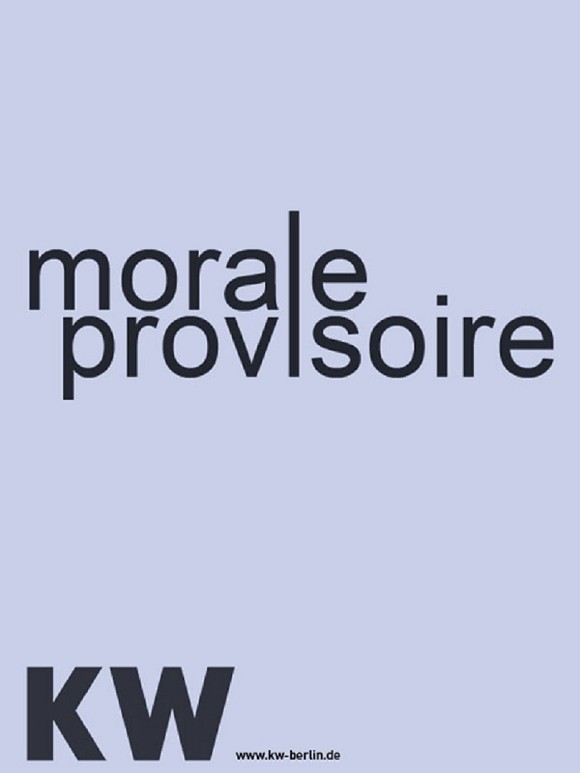morale provisoire discussion #4. Jelica Šumič Riha: The 21st century has not yet begun
morale provisoire discussion #4
Jelica Šumič Riha: The 21st century has not yet begun
16.11.2010, 7 pm
Broadly, what is at stake is nothing less than examining the possibility of politics in today’s world where the collapse of Marxism gives free reign to the only surviving proponent: neo-liberal thought. This paper sets out to answer the question how Badiou’s attempt to bring the communist hypothesis into existence in the era of the total hegemony of the capitalo-parliamentarism, for the purposes of combating the contemporary nihilism of a “politics without politics”, constitutes the opening for another thinking of politics, one in which the relationship between eternity and change is constitutive of politics. The second task of this paper is to look at Badiou’s notion of a “moral provisoire” for the worldless times and suggest that this notion which mobilizes the powers of philosophy constitutes a frame of reference for a radical novel conception of history: that of the eternal.
Jelica Šumič Riha is Professor of Philosophy at the University of Nova Gorica and Senior Research Fellow at the Institute of Philosophy, Scientific Research Centre in Ljubljana; director of the doctoral programme at the University of Nova Gorica. She is visiting professor at the University of Essex (1994-1998); University Paris 8 (2003-2004), and she has conducted seminars at the Collège international de philosophie in Paris. She has published a number of philosophical works, including Politik der Wahrheit (with Alain Badiou, Jacques Rancière, and Rado Riha; ed. Rado Riha; Turia + Kant, Vienna 1997); she has edited and contributed to an ontology on Universel, Singulier, Sujet (with Alain Badiou, et al.; Kimé, Paris 2000); Mutations of Ethics (Založba ZRC 2002); Philosophy, psychanalyse: alliance ou misalliance (FV-2006); What is to Live?/Qu’est-ce que vivre? (FV-2009); and Les pouvoirs des desires indicibles (together with Jean-Pierre Marcos; FV-2010). Currently, she is working on a forthcoming volume on Volonté et désir (Harmattan, Paris 2010), on her book De l’Autre au Même (Horlieu, 2011) as well as on the forthcoming Ethics of Silence (Založba ZRC, 2010).
Following the lecture, there will be a talk with Jelica Šumič Riha, Frank Ruda and Jan Völker.
The event will be held in English language. Admission is free.
morale provisoire discussion series
Descartes gives the example of the travelers who got lost in the woods. In order not to remain in the same spot or lose their bearings they need a "morale par provision" to guide their steps. A "morale provisoire" is a determined attempt to follow a direction, it approaches thinking in terms of guiding principles for the practice. In a Kantian sense, to orientate oneself in thinking means to follow the subjective principle of reason; and thus, like Rousseau, to first of all let go of what is regarded as facts: everything that is there, be this bodies or languages, individuals or communities praised by the maxims of today's time. Badiou counters these through his idea of a subjective orientation in which the subject departs from an impossible starting point. The series morale provisoire is set against the libertarians, liberals, sophists and social chauvinists of our times and intends to bring together guiding interventions for theory and practice. The series aims at a new courage of thinking which approves of the impossible, the infinite, the same and the illegitimate. Morale provisoire pursues a Jacobinism of thinking which, on its path out of disorientation, continually redefines its enemies.
On an irregular basis, the morale provisoire discussion series will present militant thinkers whose works can be read in relation to the questions a morale provisoire poses. Together with the speakers the series looks at whether today there is a demand for a "morale provisoire" as a concept both for thinking as well as for everyday actions – and if so how it would be possible. To what extent are subjective orientations at all possible in a time which can be understood as generally disoriented? In which way can this be understood as a time of disorientation? Which are the means of analysis? To what extent do subjective orientations have to depart from impossible situations? How can such points be described; what determines and preconditions them? What could be considered as figures, points, means and methods of such a morale provisoire and how and where do we recognize its enemies? How to give less weight to descriptions of disorientation and more to the analyses of impossible departure points of new trajectories and forms? The invited guests are not only philosophers but moreover friends whose works circulate around one or several conditions of philosophy – art, love, politics, science.
The discussion series morale provisoire at KW Institute for Contemporary Art in Berlin augments a book series of the same title published by Merve Verlag and edited by Frank Ruda and Jan Völker. In conjunction with the publishing house and the editors the discussion series dedicates itself to regularly bringing together orientations in terms of science, politics, art and love in order to assess how these are committed to the field of philosophy.
Project management KW Institute for Contemporary Art: Anke Schleper


